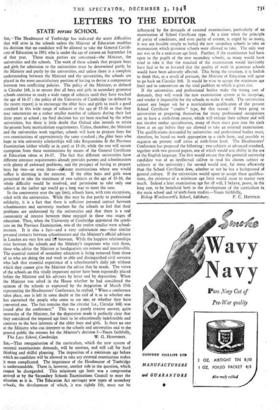Sm,—That reorganisation of the curriculum, whicii the new system of
external examinations demands, will be onerous, and will call for hard thinking and skilful planning The imposition of a minimum age before which no candidate will be allowed to take any external examination makes it more complicated. The impatience of the Headmaster of Tonbridge is understandable. There is however, another side to the question, which cannot be disregarded. This minimum age limit was a compromLse arrived at by the 'Secondary Schools Examinations Council to meet the situation as it is. The Education Act envisages new types of secondary schools, the development of which, it was rightly felt, must not be influenced by the demands of external examinations, particularly of MI examination of School Certificate type. At a time when the principle of parity of conditions, and even parity of esteem, is urged by so many, it was not feasible simply to forbid the new secondary schools to take an examination which grammar schools were allowed to take. The only way out was to fix a minimum age limit. Further, if the examination had been open to the pupils of the new secondary schools, so many would have tried to take it that the standard of the examination would inevitably have had to be so lowered that the quality of work in grammar schools would have been adversely affected. This being the situation, it is foolish to think that, as a result of pressure, the Minister of Education will agree to go back on Circular 168. It would be wise to accept the minimum age limit and to concentrate on the vital problem to which it gives rise.
If the universities and professional bodies make the wrong sort of demands, they will wreck the new examination system at its inception, and render it impossible for the schools to make it work. The universities cannot any longer ask for a matriculation qualification of the present School Certificate " credits " type, for this reason : if boys going to universities or preparing themselves for many professional occupations are to have a sixth-form course, which will enlarge their culture and will not involve undue specialisation, many of them must pass into the sixth form at an age before they are allowed to take an external examination. The qualifications demanded by universities and professional bodies must, therefore, be based on work appropriate to a sixth form, and possible to organise on present staff ratios at sixth-form level. The Headmasters' Conference has proposed the following: two subjects at advanced standard, together with two general papers, one of which would test ability in the use of the English language. The first would ensure that the potential university candidate was of an intellectual calibre to read his chosen subject or ' subjects at the university ; the second would test, far more effectively than the School Certificate does, whether or not he has a background of general culture. If the universities would agree to accept these qualifica- tions, the existence of a minimum age limit would cease to matter very much. Indeed a later examination age for all will, I believe, prove, in the long run, to be beneficial both to the development of the curriculum in the main school and to' sixth-form studies.—Yours faithfully,
Bishop Wordsworth's School, Salisbury. F. C. HAPPOLD.


































 Previous page
Previous page